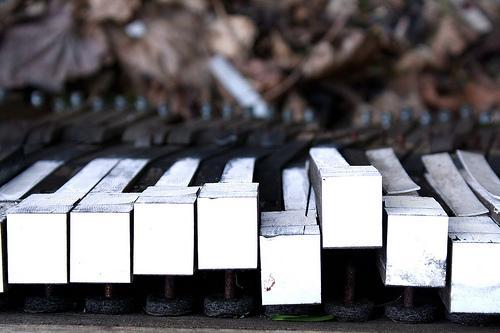I believe in putting the music first. If you’ve read my previous contributions to ArtsHub you’ll have noticed that, despite my best efforts to advise on the business, I always come back to the same point: make good music – the music you want to make. You’d almost be forgiven for interpreting this as advice to forget about the business. If only that were possible.
We all need money and if music is more than just a hobby to you, then money is hard to make and easy to spend. If you’re an independent musician, you probably feel like you need to spend all that you have (and a little more) to get your music recognised in the public space. Generally speaking, you’re right.
In a business overflowing with schemers, desperados, middle-men and plain old incompetents, it can be difficult to work out exactly where your hard-earned cash should go.
These five tips are designed to help you get the most out of your dollars in the current music-business environment.
1. Feel good about commissions
As a rule, anybody willing to work for a commission (i.e. a percentage of sales or live income) can usually be assumed to have your career interests at heart. Managers, agents, publishers and record labels almost always work on this basis – and sometimes even advance money to the artist to speed up the business and increase the chances of success. These guys work on the ‘short-tail’ theory – they take on a small number of acts and work hard to ensure that those acts succeed. Of course you should always think carefully before signing any contracts, as commission-based deals usually demand fairly long terms and exclusivity.
2. Look out for the long tail
There are other middle-men out there who operate on the ‘long tail’ theory. This means that they’ll sign almost anybody and work for an up-front fee (sometimes fee plus commission). Often these are companies rather than individuals, and you will have little personal engagement with an individual, just dealing with an anonymous customer-service team. They’ll offer services ranging from the essential (such as distribution for your CD or media release) through to the highly unnecessary/highly subjective (such as ‘song-writing assessment’ or ‘guaranteed album reviews’). You can’t avoid the ‘long-tailers’ altogether, but by being aware of their business model and the relatively low level of their investment in your music, you can make informed decisions and get better value for money.
3. Pay for personal service, where possible
Essentially, the aim of this article is to save you money. But there are times when you really are better off spending a little more to avoid those impersonal long-tail solutions. For instance, there are many companies out there that offer to distribute your press release to magazines, TV stations, newspapers and bloggers for a set fee. Put simply, these are not publicists. They are online businesses that have gathered (or perhaps bought) music business contact databases. The distribution service they offer is not targeted and they are unlikely to yield good results. Similarly, there are others that offer to build and host your website for just a couple of hundred bucks per year. Usually, they’ll tell you that you can sign-up online with your credit card and start building straight away. Only trouble is, two hours later you find yourself with a very limited, inflexible website that looks exactly like the sites of all the other artists that signed up to the service. Getting personal service from a web-developer is not necessarily that expensive – same goes for independent publicists. Furthermore, these professionals will usually only work on projects they believe in. I don’t know about you, but I’d rather look like a musician that some other professional believed in, not just a guy with a credit card.
4. Facebook ads? Not right now…
A few months ago, I’d have said Facebook ads were a great idea. After all, why not advertise in the very place where half the folks in the world spend half their day? Add to that the excellent targeting options and negligible entry level price point and it would seem Facebook ads were a winner for the independent musician (or small business owner, for that matter). The formula was simple – advertise to your potential audience and encourage them to opt-in by ‘liking’ your page – you could then feel pretty confident that your new fans would receive your regular updates whilst perusing their Facebook newsfeed. It almost negated the necessity for a traditional mailing list. But perhaps it was too good to be true. Facebook has made a few changes lately, and in doing so has dramatically reduced the value of having a large contingent of Facebook fans. Page owners (in this case musicians) now find that their statuses reach only a small percentage of their fans, and must now pay upwards of $5 per post to ensure that all their followers see their updates. The cost actually increases significantly once you get above a few thousand ‘likes’, meaning that artists that have already spent advertising money with Facebook to attract an audience must now pay again every single time they want to reach those same people. Page owners are understandably upset by this, and I’d suggest you watch this space for some concessions on Facebook’s part. In the meantime, try community radio ads, banners on credible blogs or plain old posters and flyers.
5. Want great sounds? Use great ears (and good gear)
I’m kind of breaking my first-paragraph-promise here, but only because I really, really believe it’s all about the music. If you’re a musician and you value things like personal fulfilment and being able to sleep at night you need to make great recordings of your songs. If you have an ear for arrangements and a head for electronics, by all means record your music yourself. But employ good musicians, and good not terribly cheap gear. If production is not your thing, find a great engineer/producer who loves what you do and is up for collaboration. I’m certainly not saying spare no expense, but I’d advise you not to scrimp. Thankfully credit card bills, debt collectors and baked bean dinners are no match for the power of rock n roll.


_Encounters-in-Reflection_Gallery3BPhoto-by-Anpis-Wang-e1745414770771.jpg?w=280)


